THE COURTS
PART II. ORPHANS' COURT RULES
[ 231 PA. CODE PART II ]
Proposed Adoption of New Pa. O.C. Rule 14.3, Form G-05 and Amendment of Index to Appendix
[47 Pa.B. 5930]
[Saturday, September 23, 2017]The Orphans' Court Procedural Rules Committee is planning to propose to the Supreme Court of Pennsylvania the adoption of new Pennsylvania Orphans' Court Rule 14.3 and Expert Report Form (G-05), together with the amendment of the Index to the Appendix, for the reasons set forth in the accompanying explanatory report. Pursuant to Pa.R.J.A. No. 103(a)(1), the proposal is being published in the Pennsylvania Bulletin for comments, suggestions, or objections prior to submission to the Supreme Court.
The Committee invites all interested persons to submit comments, suggestions, or objections in writing to:
Orphans' Court Procedural Rules Committee
Supreme Court of Pennsylvania
Pennsylvania Judicial Center
PO Box 62635
Harrisburg, PA 17106-2635
FAX: (717) 231-9551
orphanscourtproceduralrules@pacourts.usAll communications in reference to the proposal should be received by October 23, 2017. E-mail is the preferred method for submitting comments, suggestions, or objections; any e-mailed submission need not be reproduced and resubmitted via mail. The Committee will acknowledge receipt of all submissions.
By the Orphans' Court
Procedural Rules CommitteeJOHN F. MECK, Esq.,
Chair
Explanatory Report The Orphans' Court Procedural Rules Committee (the ''Committee'') proposes the adoption of new Pennsylvania Orphans' Court Rule 14.3 and Expert Report Form (G-05), together with the amendment of the Index to the Appendix.
Background
In 2013, the Court constituted a 38-member Elder Law Task Force (''Task Force'') to formulate a plan for substantive improvements in the way Pennsylvania's court system interacts with elders, including the topics of guardianship, elder abuse, and neglect, and overall access to justice. In 2014, the Task Force delivered a comprehensive 284-page report detailing 130 specific recommendations to help lay the foundation for improvements in the courts and by other government entities relating to elder issues. The report contained a number of specific recommendations for amendment of the Orphans' Court Rules.
The report also proposed modification of existing statewide forms for guardianship matters and the addition of several new forms, including a form for the written deposition of an expert in uncontested guardianship proceedings. The goal of the form was to relieve the expert of the burden of testifying in person, as well as avoiding unnecessary expert fees in uncontested cases. Moreover, the need for one less witness to appear would ease scheduling difficulties and shorten proceedings.
Prior Proposals
In 2015, the Committee published for comment the Task Force's proposed form entitled ''Deposition by Written Interrogatories of Physician or Licensed Psychologist'' as part of a larger package of forms. See 45 Pa.B. 1070 (March 7, 2015). Notably, the form was not accompanied with procedural rules governing the use and admissibility of the form. The Committee received four comments related to the proposed form. The Committee reviewed these comments and formed a subcommittee, which included a physician and experienced practitioners, to formulate and recommend responsive revisions to the form. Ultimately, the subcommittee submitted a revised form to the Committee.
The Committee also considered whether the form should be self-executing or require an enabling rule. The Committee believed a rule was necessary to govern the circumstances in which the form may be used and to provide commentary guiding its intended use. Therefore, the Committee developed a new rule to implement the form.
In 2016, the Committee published proposed new Rule 14.6 and a revised form for comment. See 46 Pa.B. 2306 (May 7, 2016). Retitled ''written deposition,'' the proposed form was intended to be completed by the evaluator and reflect the evaluator's assessment of the capacity of the alleged incapacitated person (''AIP''). See also 20 Pa.C.S. § 5518. In uncontested matters, the form could be submitted to the court in lieu of live testimony. The Committee received eight comments.
The form-related comments were provided to the subcommittee for further assessment. To assist the subcommittee, a physician undertook a review of the comments and authored feedback from a physician's perspective. Further, there was one particular aspect of the form (Question 9) addressing the AIP's ability to perform various listed functions that received specific comments from four commenters. The Chair invited several of those commenters to supplement their comments by providing proposed revisions for the subcommittee's consideration. Those proposed revisions were then considered by the subcommittee and then by the Committee.
Regarding the proposed rule text, a significant question arose as to the procedure for using the form. The sole precondition that incapacity be uncontested lacked the necessary structure to provide for the orderly and timely use of the form. If uncontested capacity was a precondition for the use of the form, then the Rule must establish a point earlier in the process of knowing whether incapacity will be contested—learning of a contest at the time of hearing defeats the purpose of the form.
Current Proposal
Tasked with devising a procedural mechanism to establish that precondition prior to the hearing and recognizing that incapacity is infrequently contested and customary procedural devices only add time to an already time sensitive matter, the Committee considered methods in other procedural bodies. Upon review, Pa.R.Crim.P. 574, which permits the admission of a certified forensic laboratory report in lieu of expert testimony, offered a framework for consideration. Here, instead of criminal defendant's exercising his/her right under the Confrontation Clause, the proposed Rule would be based upon whether an alleged incapacitated person seeks to exercise his/her right of cross-examination pursuant to 20 Pa.C.S. § 5518.1 (''Testimony as to the capacity of the alleged incapacitated person shall be subject to cross-examination by counsel for the alleged incapacitated person.'').
Embracing this approach, the Committee eliminated ''uncontested'' as a pre-condition for use of the form by the petitioner, relying instead on 20 Pa.C.S. § 5518.1. A ''cross-examination'' trigger arguably sets a lower threshold for live testimony than a ''contest'' trigger because cross-examination does not necessarily translate into a contest; however, the statute requires that testimony be subject to cross-examination.
Preliminarily, the Committee concluded that, to make a knowing, intelligent, and voluntary decision whether to demand the testimony of an expert witness, the completed form must first be provided to the alleged incapacitated person or his/her counsel. However, this consensus led to a searching discussion about whether a notice and demand approach may lead to the routine appointment of counsel for the alleged incapacitated person to assist in making the decision to demand testimony. Members from higher volume counties and those counties with institutional care facilities expressed concern about the financial burden associated with appointment of counsel in every case, especially when their experience suggested that a large majority of petitions involve uncontested incapacity. Ultimately, the Committee found that the notice and demand approach provided the necessary procedural device to trigger the admission of the form in lieu of testimony notwithstanding the potential impact on those counties that do not routinely appoint counsel.
Regarding the name of the form and title of the Rule, it has been changed from ''written deposition'' to ''expert report'' to better reflect its substance.
The Committee discussed whether the Rule should address if the form may be used for emergency petitions. Members thought that the timeline for emergency petitions was too abbreviated to provide for a notice and demand procedure in those circumstances. Rather than entirely foreclose the use of the form in emergency petitions, the Committee believed it was best to leave its use to judicial discretion. This approach, as reflected in paragraph (a), permits the judge to determine on an ad hoc basis whether the form can be used for an emergency petition. The Committee did not consider this a burden on the judge because these cases are closely managed as a matter of practice.
Following the contours of Pa.R.Crim.P. 574, the Rule reflects a ''notice and demand'' approach at paragraphs (b) and (c). In order to provide timely notice, paragraph (b)(1) contains a ten-day notice in which a copy of the completed form must be served upon the alleged incapacitated person or his/her counsel, if counsel has been appointed, and all other counsel of record. The Committee deliberated on whether the other counsel of record should receive a copy of the completed form or whether notice of this form was sufficient. The Committee believed that if counsel had entered an appearance, then counsel should be served the same documents as the alleged incapacitated person. To ensure timely service upon the alleged incapacitated person, paragraph (b)(1) requires personal service by a competent adult as the alleged incapacitated person would be less likely to have access to email or a facsimile in order to benefit from the full penumbra of service options under Rule 4.3.
As set forth in paragraph (b)(2), other persons entitled to notice of the petition and hearing would only receive notice that the petitioner intends to proceed with a form rather than in-person testimony or a deposition. The notice-only language was intended to address privacy concerns about wider dissemination of the report.
Paragraph (c) provides for a rather expeditious five-day turnaround for filing a demand for live testimony at the hearing. However, this expedited requirement is necessary to ensure a timely hearing. If a demand is filed, then the petitioner must either present the expert at the hearing or conduct a deposition where the expert would be subject to cross-examination. A demand is likely going to require a continuance of the hearing unless the expert is unexpectedly available on short notice. Please note that the demand provision does not extend to those who are entitled to service of the notice of the petition and hearing. If anyone other than the alleged incapacitated person wishes to object, then he/she should seek permission to intervene rather than file a demand.
The Committee considered an alternative where there was no established deadline to file a demand. This concept reflected the practicality that a judge would not permit the use of a form in lieu of live testimony if the alleged incapacitated person contested incapacity and demanded the presence of an expert at the hearing, but either did not file a demand or filed an untimely demand. However, the Committee rejected this alternative believing the procedural rule should establish a requirement for a timely demand, albeit aspirational, so that the petitioner may rely upon the absence of a timely demand in preparing for the hearing.
The Committee is cognizant that circumstances so differ among alleged incapacitated persons and guardianship proceedings that creating one rule and one form to be used in all proceedings may be challenging, especially for the timing and service requirements. The Committee proposed paragraph (e) to provide the court with flexibility in applying the requirements for notice and demand. While the ''interest of justice'' standard may escape precise definition, it is not a foreign concept in procedural rules. See, e.g., Pa.R.Crim.P. 567(B)(1) (failure of criminal defendant to file a notice of alibi). The Committee believes the phrase is sufficiently fluid to permit the judge to exercise his or her discretion to ensure a fair, just, and efficient proceeding.
On August 19, 2017, the Committee republished for comment a revised proposal that would rescind and replace Chapter XIV of the Pennsylvania Orphans' Court Rules, Pa. O.C. Rules 14.1—14.5, together with related forms. See 47 Pa.B. 4815 (August 19, 2017). The intention of that proposal was to respond to Elder Law Task Force recommendations and to provide more comprehensive statewide rules establishing uniformity and consistency for guardianship proceedings. Within that proposal is Rule 14.3 (Written Deposition). This proposal would replace Rule 14.3 and Form G-05 when both proposals are integrated and submitted to the Court.
The Committee invites all comments, concerns, and suggestions regarding this proposal.
Annex A
TITLE 231. RULES OF CIVIL PROCEDURE
PART II. ORPHANS' COURT RULES
CHAPTER XIV. GUARDIANSHIPS OF INCAPACITATED PERSONS Rule 14.3 Alternative Proof of Incapacity: Expert Report in Lieu of In-Person or Deposition Testimony of Expert.
(a) A petitioner may seek to offer into evidence an expert report for the determination of incapacity in lieu of testimony, in-person or by deposition, of an expert using the form provided in the Appendix to these rules. In an emergency guardianship proceeding, an expert report may be offered into evidence if specifically authorized by the court.
(b) Notice.
(1) If a petitioner seeks to offer an expert report permitted under paragraph (a), the petitioner shall serve a copy of the completed report upon the alleged incapacitated person's counsel and all other counsel of record pursuant to Rule 4.3 or, if unrepresented, upon the alleged incapacitated person, pursuant to Pa.R.C.P. No. 402(a) by a competent adult no later than ten (10) days prior to the hearing on the petition.
(2) If a petitioner seeks to offer an expert report, as permitted under paragraph (a), the petitioner shall serve pursuant to Rule 4.3 a notice of that fact upon those entitled to notice of the petition and hearing no later than ten (10) days prior to the hearing on the petition.
(3) The petitioner shall file a certificate of service with the court as to paragraphs (b)(1) and (b)(2).
(c) Demand.
(1) Within five (5) days of service of the completed report provided in paragraph (b)(1), the alleged incapacitated person's counsel or, if unrepresented, the alleged incapacitated person, may file with the court and serve upon the petitioner pursuant to Rule 4.3 a demand for the testimony of the expert.
(2) If a demand for testimony is filed and served as provided herein, then the expert report may not be admitted and the expert must provide testimony at the hearing.
(d) Unless otherwise demanded pursuant to paragraph (c)(2), in the sole discretion of the court, incapacity may be established through the admission of an expert report prepared in compliance with the form provided in the Appendix to these rules. The expert must be qualified by training and experience in evaluating individuals with incapacities of the type alleged in the petition. The expert must sign, date, and verify the completed interrogatories.
(e) In the interest of justice, the court may excuse the notice and demand requirements set forth in paragraphs (b) and (c).
Explanatory Comment: This rule is intended to permit the alleged incapacitated person to exercise the right to cross-examine testimony as to the capacity of the alleged incapacitated person. See 20 Pa.C.S. § 5518.1. Permitting the use of an expert report in compliance with this rule replaces the requirement of testimony, in-person or by deposition, of an expert. See 20 Pa.C.S. § 5518. The rule is permissive; whether an expert report is admitted in lieu of testimony is in the sole discretion of the court. Nothing in this rule is intended to preclude the court from requiring testimony from the expert or otherwise requiring supplementation.
INDEX TO APPENDIX
ORPHANS' COURT AND REGISTER OF WILLS FORMS
ADOPTED BY SUPREME COURT
PURSUANT TO Pa. O.C. Rule 1.8
Available as Fill-in Forms on Website
of Administrative Office of Pennsylvania Courts
http://www.pacourts.us/Forms/OrphansCourtForms.htm
Orphans' Court and Administration Forms * * * * * B. Guardianship Forms
* * * * * 6. Guardianship of Minor: Petition for Adjudication/Statement of Proposed Distribution Pursuant to Pa. O.C. Rule 2.4
OC-04**7. Expert Report
G-05C. Abortion Control Act Forms
* * * * *
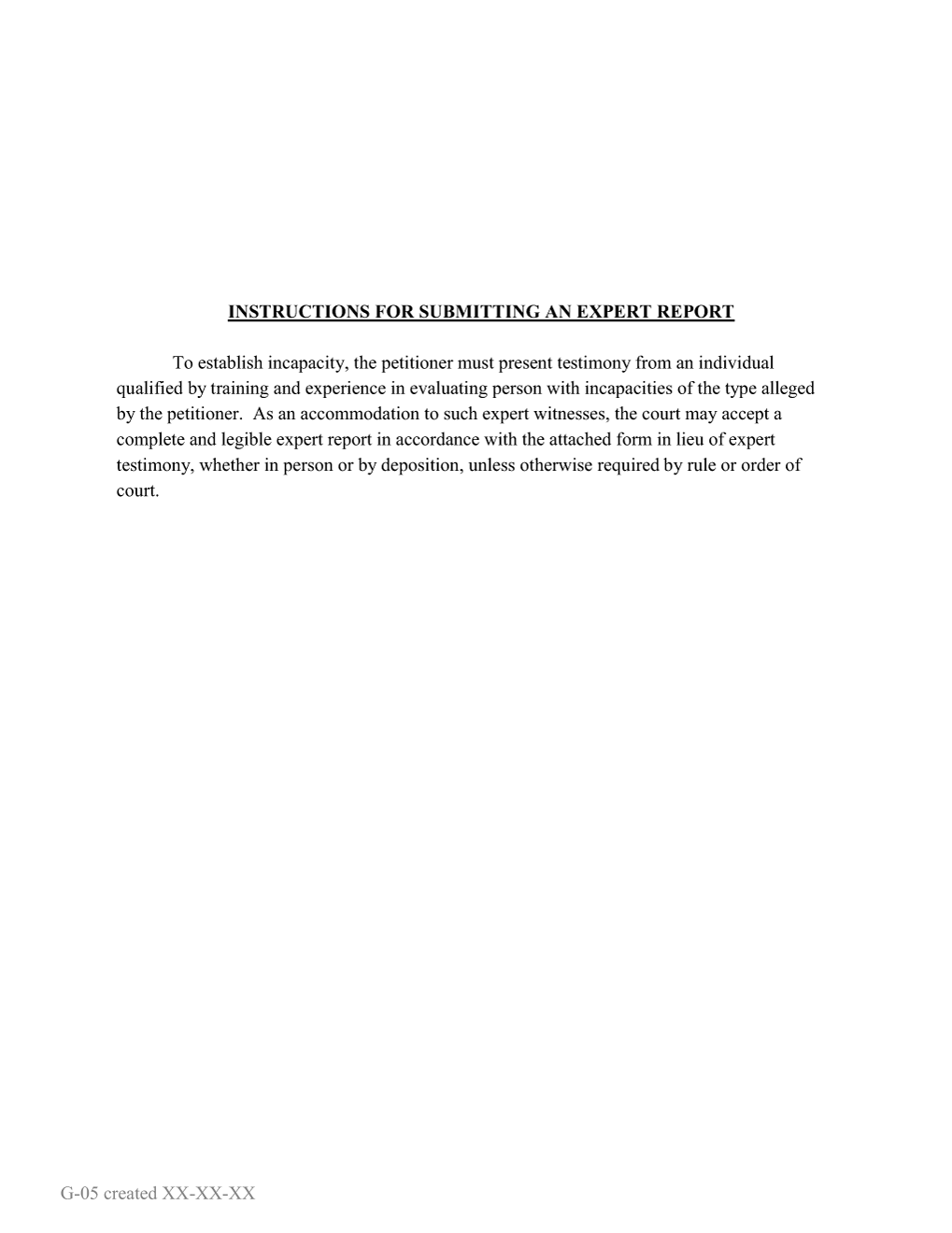
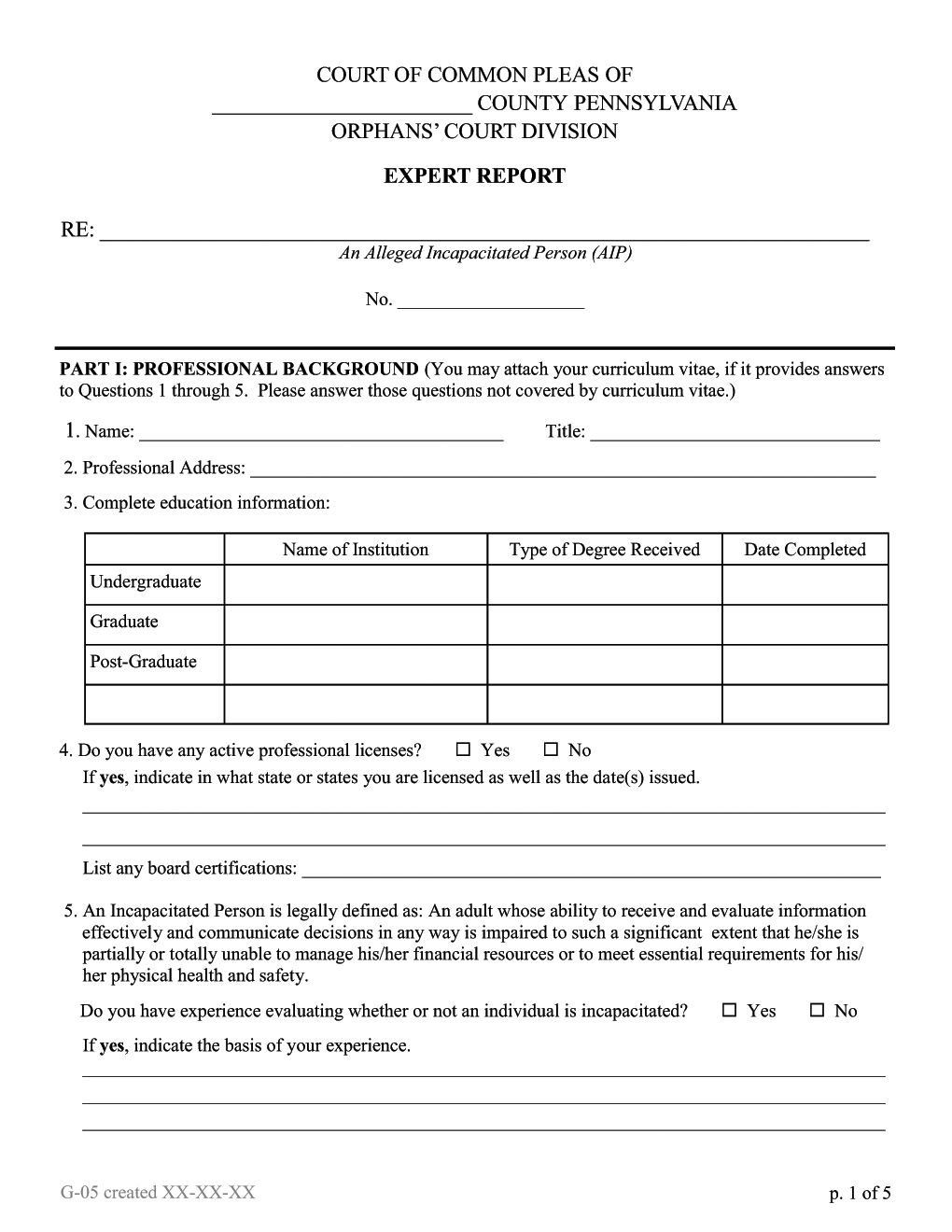
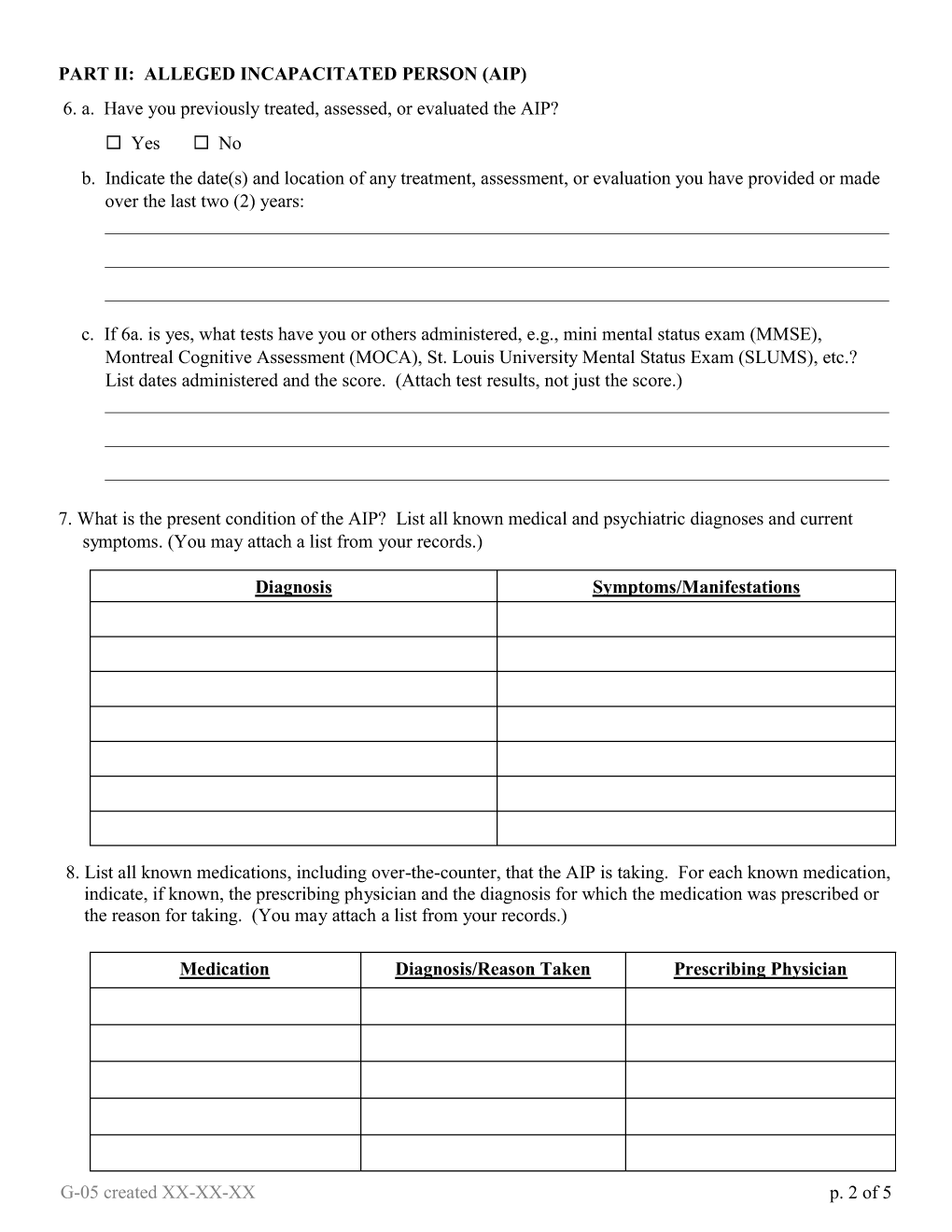
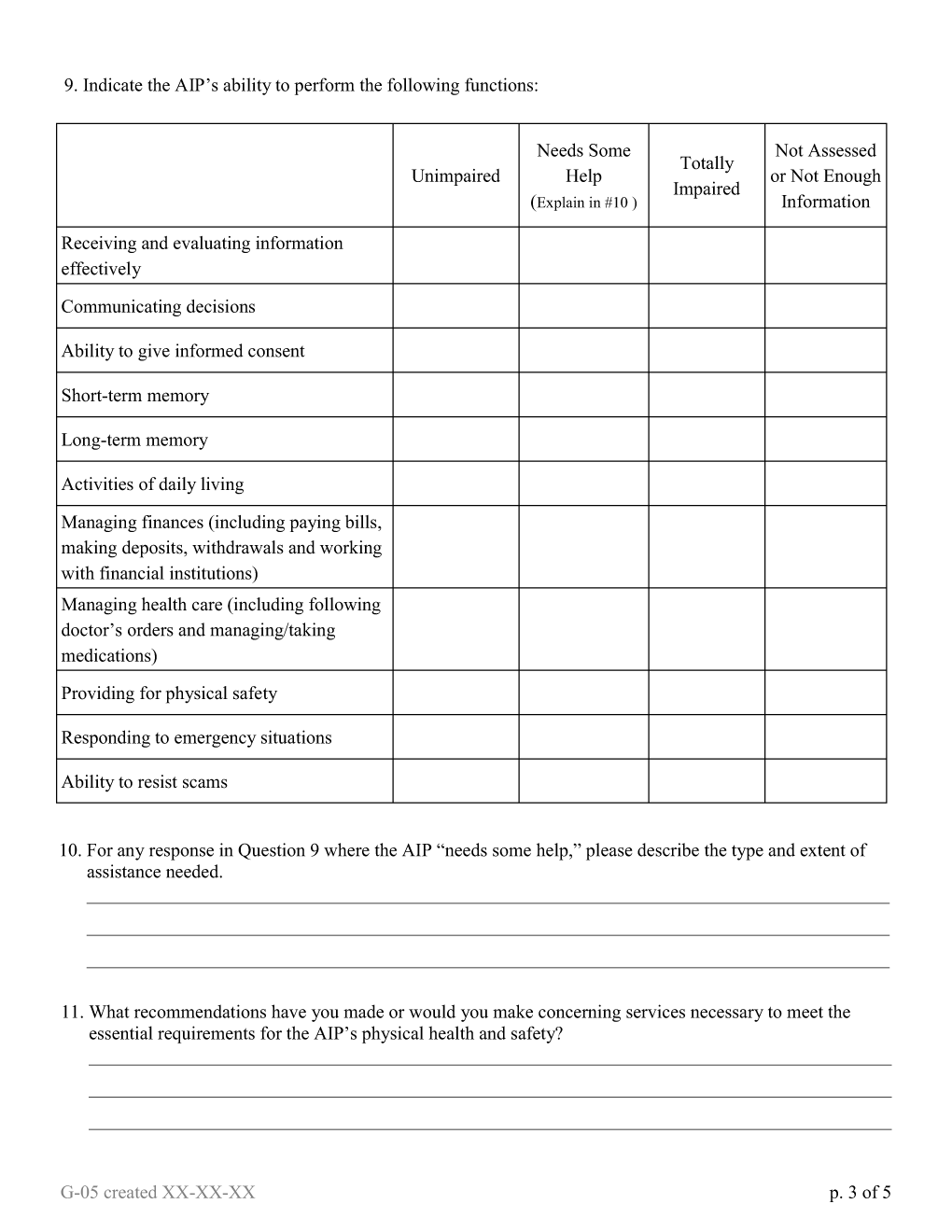
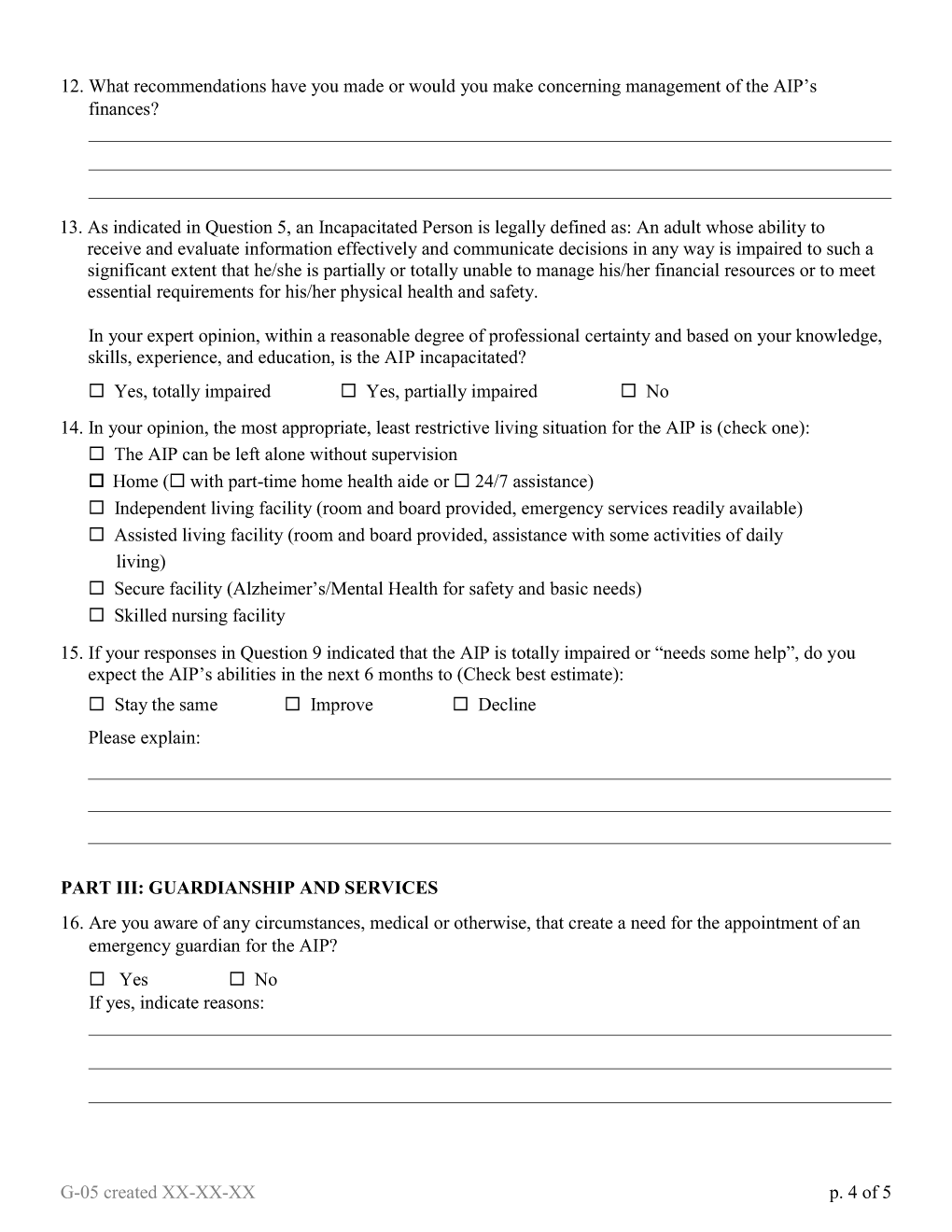
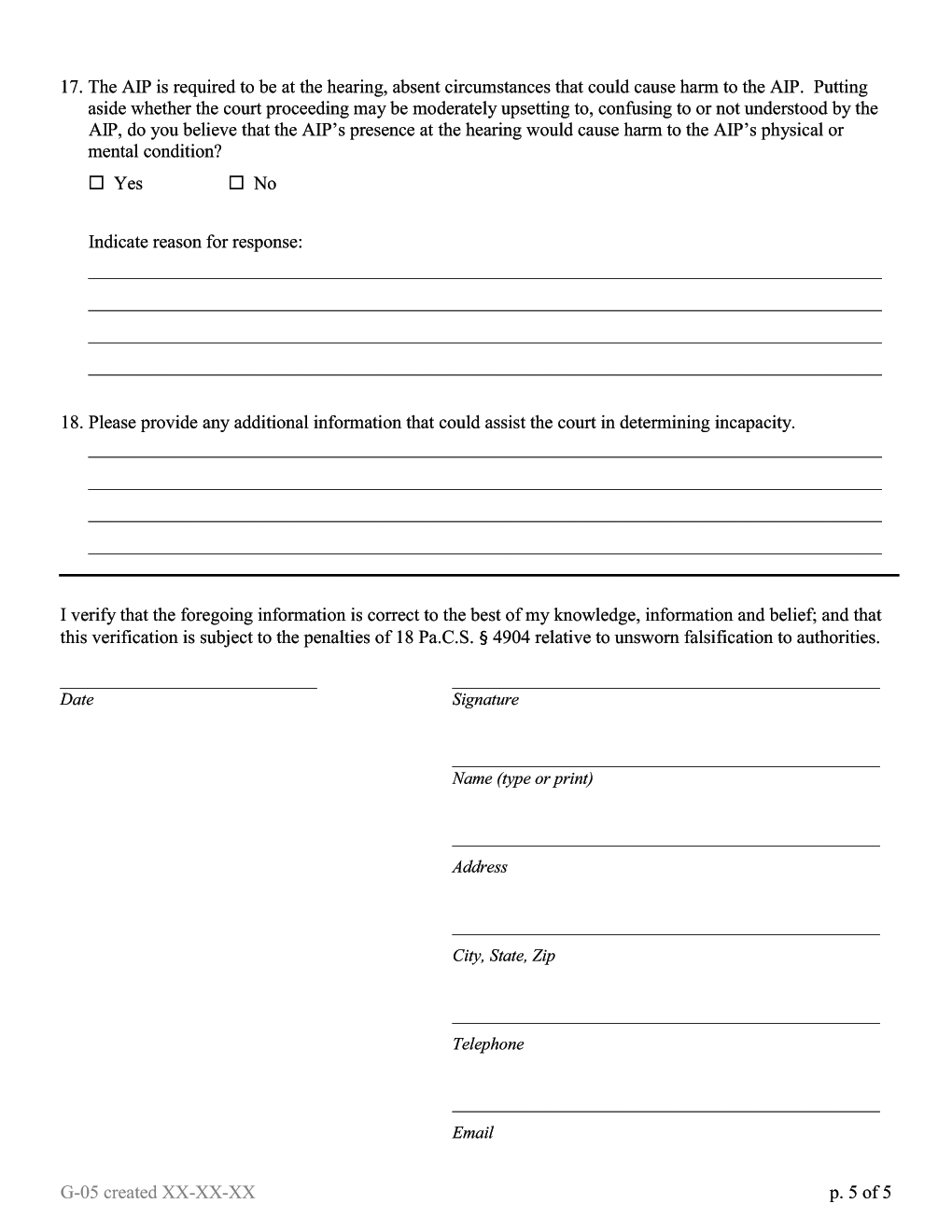
[Pa.B. Doc. No. 17-1571. Filed for public inspection September 22, 2017, 9:00 a.m.] _______
** Form OC-4 is not reprinted here and is located under Audit and Administration Forms at No. 4.
No part of the information on this site may be reproduced for profit or sold for profit.This material has been drawn directly from the official Pennsylvania Bulletin full text database. Due to the limitations of HTML or differences in display capabilities of different browsers, this version may differ slightly from the official printed version.